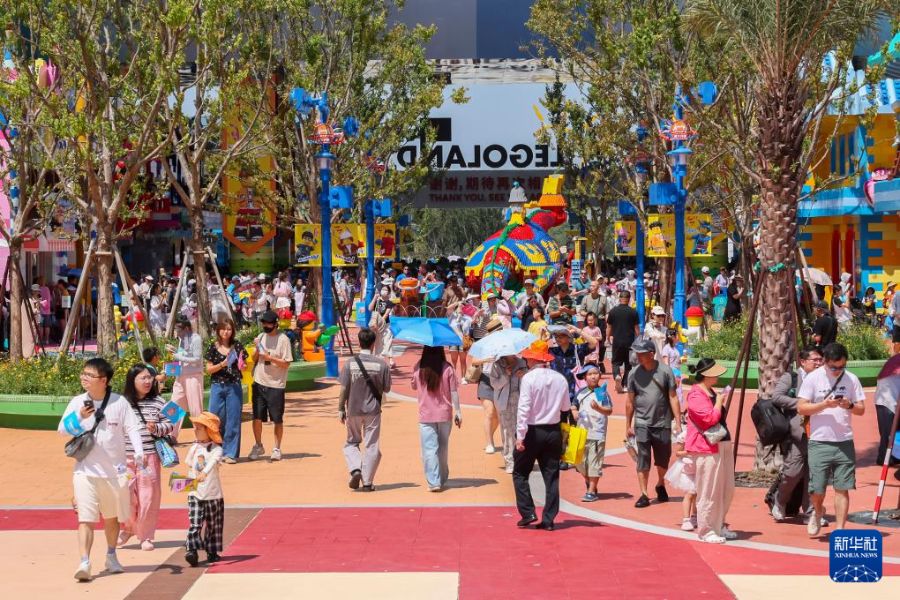The Business of Happiness丨CBN Perspective
Hello! Welcome to this edition of CBN Perspective. I’m Stephanie Li.
For most kids, summer vacation is probably one of the happiest time in a year. If you’re still making traveling plans, the newly-launched LEGOLAND in east China might just be the place to go, especially if you’re looking for “happiness.”
The resort in Shanghai, currently the largest LEGOLAND globally and the first in China, offers a new amusement option for Chinese citizens and foreigners visiting this metropolis.
The opening of LEGOLAND Shanghai Resort on Saturday coincides with the beginning of the summer vacation, which is a tourism and consumption high season, especially for students.

Case in point: a day before the resort officially opened on July 5, its mini-program crashed under overwhelming traffic. The glitch highlighted just how high the appetite is for the “happiness business” in one of the world’s fastest-growing markets for entertainment.
This goes beyond nostalgia and family fun. From ongoing expansions at Shanghai Disney Resort to the opening of LEGOLAND Shanghai and the development of new IP-led attractions, China’s so-called "happiness economy" is emerging as a key focus for both domestic and international investors.
Marking its ninth anniversary this June, Shanghai Disney Resort exemplifies the trend through ongoing expansion. It unveiled plans for its first Marvel-themed attraction and is building a third themed hotel, as well as major upgrades to its Tomorrowland and Adventure Isle themed areas. Hong Kong Disneyland will also enlarge its Marvel zone and introduce new Pixar-themed entertainment.
Universal Beijing Resort is preparing for its second phase of development. Construction at LEGOLAND Shenzhen is also speeding up. The world's largest Peppa Pig outdoor park is scheduled to open in Shanghai in 2027, while the Harry Potter Studio Tour in Shanghai is expected to open in the same year.
Domestic players are rising quickly too. Fantawild launched nine parks in just eight months last year. Pop Mart is redesigning two-thirds of its City Park in Beijing and preparing for the second phase next year.
Nationwide, more than 50 new theme parks are in development or set to launch this year, spanning diverse themes from cinema and gaming to winter entertainment, marine worlds, forests and water-based attractions.
As of October 2024, there were 385 theme parks operating on the Chinese mainland, with 87 classified as large or super-sized – each occupying over 600 mu (40 hectares) or backed by investments exceeding 1.5 billion yuan.
According to data from China Insights Consultancy, the country’s amusement park sector reached nearly 60 billion yuan in 2023 and is projected to surpass 110 billion yuan by 2028. This growth is underpinned by urbanization, rising disposable income, and evolving consumer expectations for leisure experiences.
However, the market penetration of theme parks in China was just 27 percent as of September 2023, far below the 68 percent average seen in developed countries. This significant disparity points to enormous room for growth.
Over the next five years, China's theme park industry is projected to expand at a compound annual growth rate of 7.2 percent, with many cities aiming to turn these attractions into iconic local landmarks.
"China offers an excellent business environment," said Siegfried Boerst, managing director of LEGOLAND Resorts in China. "LEGOLAND Shanghai has a series of world's first to fulfill the growing demand. All this will help boost the regional economy, create job opportunities and enhance Shanghai's competitiveness in the international tourism market.”
As China is thriving to shift to a consumption-driven economy, the cultural and tourism industries are becoming important growth drivers.
Earlier this year, the Chinese government made it one of its major priorities to boost consumption and stimulate domestic demand across the board. It urged more efforts to foster new forms of cultural business and vigorously develop the tourism industry.
Yet as over 50 new parks debut nationwide this year, the race shifts from expansion to differentiation. Disney’s IP-driven success has spurred Chinese theme park operators to blend top IPs with experiential consumption, aiming to boost sustainability. Recent moves underscore this shift: Universal Beijing’s 2023 Honor of Kings events and Pop Mart’s 2023 immersive IP venue.
IP construction relies on continued content innovation. In China, parks revitalize existing IPs by combining traditional culture with adventure. Mianyang’s Fantawild Oriental Heritage and Zigong’s Fantawild Dinosaur Kingdom weave myths, history, and Sichuan’s ancient Shu culture, highlighting Chinese heritage’s draw.
Teaming up with global IPs is another path to follow. Haichang Ocean Park’s use of Ultraman and One Piece enriches its offerings, striking a chord with diverse crowds.
Amid the cultural-tourism blend, theme parks are doubling down on cultural elements—backed by policies pushing deeper integration to meet demand for quality experiences.
Operators now understand that viable, market-ready IPs are key to steady revenue and longevity. Yet a critical hurdle persists: turning cultural motifs into profitable IPs while spreading Chinese culture globally.
As IP awareness grows, nailing the balance of authenticity, innovation, and profitability will determine if China’s parks can mirror Disney’s success—turning cultural depth into lasting “happiness economy” powerhouses.

Editor: LI Yanxia
Host: Stephanie LI
Writer: Stephanie LI
Sound Editor: Stephanie LI
Graphic Designer: ZHENG Wenjing, LIAO Yuanni
Produced by 21st Century Business Herald Dept. of Overseas News.
Presented by SFC


